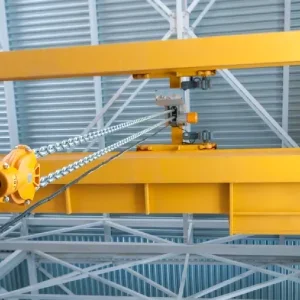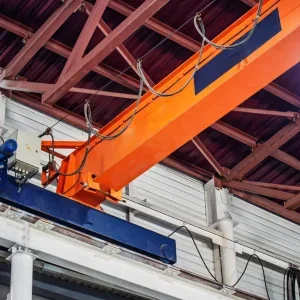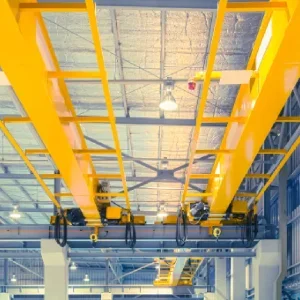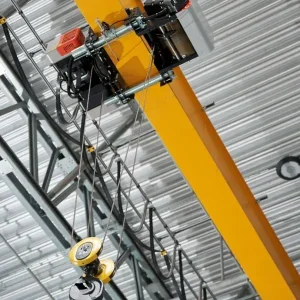The year 2011 will surely be remembered most in the Middle East and North Africa (MENA) for the Arab Spring uprisings across parts of the region, with demonstrators calling, variously, for democratic reform, greater liberalisation and an end to government corruption. Revolutions in three North African countries — Libya, Tunisia and Egypt — saw the heads of state ousted. There were also demonstrations in Bahrain, Kuwait, Oman, Lebanon and Yemen.
Across the region reform is in the air, even in Saudi Arabia, where King Abdullah has extended voting rights to women.
Some in the crane industry hope that political reform might lead to new business opportunities.
For Turkish crane builder Elektro-Mak Vinç Sistemleri, geographic proximity makes the MENA region its core export market, particularly Iran, Saudi Arabia, the United Arab Emirates (UAE) and Iraq.
“Iran especially has strong demand for heavy duty cranes. There are lots of companies in the iron and steel market in Iran. And for standard cranes, we have lots of inquiries from Saudi Arabia, Iraq and the UAE,” says Elektro-Mak sales and marketing manager Sükrü Terzi.
“In North Africa, Egypt is a strong country with a strong demand. We have lots of customers and a partner in Egypt,” he says. “Also Algeria is a growth country with good potential.”
Up until now, though, Elektro-Mak has steered clear of Libya because, although there is demand, a lot of Turkish companies have lost money there, Terzi says.
Terzi says that it is too soon to know what the long-term implications of the Arab Spring uprisings will be “because everything can change suddenly in the Arab Spring countries”.
In the short term, it has created some problems for a lot of businesses; Elektro-Mak had a customer in Egypt that cancelled a contract when trouble kicked off. But in the long term, Terzi says moves to greater democracy will open up opportunities for new partnerships and new investments.
In other countries, such as the UAE, Saudi Arabia, Kuwait, Iran and Qatar, stable government has been maintained and oil-derived wealth ensures continuing industrial investment.
Terzi says that enquiries from these countries increased in 2011, and exports to Iran, for example, were up 15%, thanks to a five-crane order from the Iranian steel company Ardabil. All five were 22m span, with safe working loads from 10t to 25t.
Elektro-Mak is looking to further expand its presence across the region and is talking to a potential distributor in Saudi Arabia.
According to Keith Rainford, sales manager for Dubai-based Ace Crane Systems, Saudi Arabia is the biggest market in the region and, since Dubai ground to a halt a couple of years ago, is now being targeted by companies who may previously have considered it too difficult a place to do business.
Ace Crane, owned by an Indian businessman with a local partner, serves the Gulf Cooperation Council countries (Saudi Arabia, Bahrain, Kuwait, Oman, Qatar and UAE) and occasionally ventures into Iran and Iraq. It used to be a Street Crane distributor until 2005 (Rainford was recruited by Ace from Street) but now works with Abus. Rainford says that with the slow-down in Dubai and northern Emirates, industrial development is now focused elsewhere. “Everyone who was in Dubai is now setting up operations in Qatar or Saudi Arabia, so now we are doing more there,” he says.
“In Dubai, the feel, tourism and retail business is coming back but I don’t see investment in industry returning on quite the scale that it was. The investment in Dubai in 2004–05 was just incredible,” Rainford says.
Now, though, there are a lot of half-finished jobs left in suspension. “They will probably be finished eventually but I don’t expect much else to start on the same scale. I think that it has bottomed out though.”
Although Dubai ground to a halt, Abu Dhabi to the south has continued its rapid development unabated. “They have serious money,” Rainford says. “Dubai was always using borrowed money, whereas all the work in Abu Dhabi — metros, hospitals, museums — never really stopped.”
Although Ace Crane has been unaffected by the Arab Spring events since it is not active in the countries concerned, Rainford has noticed “an undercurrent of political will” in Saudi Arabia to make it an easier place to do business, to get visas and to visit.
Ace Cranes has taken advantage of the softening of sentiment towards foreign service companies by registering a wholly-owned subsidiary in Saudi Arabia. This is initially a sales and service operation, with a small workshop, but the plan is to have a factory there in 18 months or so, based most likely in Dammam, or maybe Jubal, with regional service centres in Jeddah and Riyadh.
Rainford says that Ace Crane has seen strong and steady growth over the last five years, with turnover growing from AED14m (€2.8m) in 2005 to AED80m (€16m) this year. It produces approximately 250 cranes a year but has capacity to produce 450.
Not many new orders were taken between the back end of 2008 and the middle of 2009 but there were major orders in hand in the UAE that had to be delivered during that period, including an order for 46 cranes with safe working loads up to 80t for Emirates Aluminium, so the breathing space was needed.
There was also an order for 89 cranes for an Al Shafar Steel structural steel fabrication facility. “By the time these were finished, we had a new strategy to target Saudi and Qatar,” Rainford says.
Over the past couple of years, Ace Crane’s growth has come from Saudi Arabia. Recent projects include supplying 16 cranes, including two 100-tonners, to GE’s new turbine maintenance facility in Dammam and five cranes up to 50t for the Saudi Electricity Corporation.
It also has two sister companies: Ace Engineering, which takes care of installation and service work, and a fabrication division called Ace Al Faris, which is a joint venture with the Dubai-based mobile crane rental group Al Faris. Ace Cranes itself is the commercial end of the operation.
Much of the excitement over Saudi Arabia in the crane industry is over a single $11bn project, which has a massive requirement for overhead cranes to be installed.
At Raz Az Zawr (also called Ras Al Khair), 90km up the coast from Jubail, Ma’aden (a Saudi Arabian Mining Company) is developing a huge, fully integrated aluminium industrial complex. Major US construction contractors, including Fluor and Bechtel, are taking a leading role.
The $11bn project includes a bauxite mine with an initial capacity of 4 million tonnes a year, as well as construction of an alumina refinery, an aluminium smelter and a rolling mill.
Supporting infrastructure includes a joint power and desalination plant that will generate 2400MW of electricity and more than a billion litres of water per day, for use by both the aluminium complex and neighbouring towns.
First commercial production from the smelter and mill is scheduled for 2013, followed by the first commercial production of alumina from the mine and refinery complex, scheduled for 2014.
Within the crane industry itself, perhaps the biggest development in Saudi Arabia this year has been the sale of Saudi Cranes & Steel Works Factory Company by Sheikh Saad Al Issa to Konecranes. The relationship between the two companies had developed over several years, including a license agreement signed in 2005.
Saudi Cranes is headquartered in Al Jubail Industrial City and has approximately 100 employees and annual net sales of €17m.
“The acquisition of Saudi Cranes will give Konecranes the opportunity to strengthen its position in the important Saudi Arabian market, which is witnessing significant growth in major industries,” Konecranes senior vice president Pierre Boyer said in June when the deal was announced.
Konecranes also has a joint venture crane business in Saudi Arabia that it inherited through its acquisition of the UK’s Morris Material Handling in 2004. Eastern Morris Crane (EMC), established in Dammam in 1999, is 49% owned by Konecranes and 51% owned by the Saudi Arabian industrial conglomerate A H Al-Zamil. EMC operations manager Allan Jones explains that though the two companies are now part of the same group, EMC and Saudi Cranes continue to compete for business as before.
Both appear to be busy. EMC has been working on a project for Global Pipe Company, a new start-up, supplying an initial 24 cranes up to 50t capacity with four more to follow in the next stage.
Recent major orders for Saudi Cranes include 19 cranes for the aluminium rolling mill at the Raz Az Zawr complex. The customer here is Ma’aden Rolling Company, a joint venture of Ma’aden and the aluminium producer Alcoa. Delivery of the cranes started in September 2011 and is scheduled to be completed in March 2012.
Saudi Cranes has also recently received a large order for heavy cranes from Hadeed Steel, a subsidiary of Saudi Basic Industries Corporation (SABIC).
Other Konecranes interests across the region include Crane Industrial Services, a 49:51 joint venture in Dubai with the Kanoo group and a wholly owned subsidiary in Morocco called Techniplus SA, which historically focused on port cranes and lift trucks but now also sells and supports overhead cranes.
It also has licensees for EOT cranes in Egypt (Commerce Co.) and in Kuwait (Al Ghanaim) as well as distributors in Bahrain, Qatar, Oman and Lebanon.
While Saudi Arabia and the UAE remain Konecranes’ biggest markets in the region, it sees potential in Iraq. “As the country emerges and exports increasing quantities of oil, this will fund industrial and infrastructure investments, which are areas where Konecranes can contribute. “We have already sold some machinery there in 2010 and 2011,” the firm says.
Overall, across the MENA region, business has “remained very solid,” Konecranes says.
“The high price of oil and gas and the large infrastructure investment plans in the Gulf in particular all support this activity.”
Street Crane of the UK also has Saudi Arabia firmly on its agenda, having signed up Juffali Heavy Equipment Company (JHECO) as its exclusive representative there just two years ago. Under the usual arrangement, JHECO fabricates the heavy structural components and sources hoists, end carriages, controls and other electromechanical systems from Street.
More recently, Street has also found itself a replacement partner in the UAE, having signed a deal with Dubai Cranes & Technical Services.
Dubai Cranes, established as recently as 2007, is one of many subsidiaries of the Dubai Investments PJSC conglomerate.
General manager Andrew Kay sees huge demand for high specification industrial cranes in Abu Dhabi’s Kalifa Port industrial zone area and from its expanding aluminium industries.
A recent Dubai Cranes/Street collaboration was a new facility for Emirates Aluminium, (EMAL) where they installed 15 heavy duty hot metal cranes of up to 50t capacity.
Free from political upheaval, perhaps the crane industry in the UAE will remember 2011 as the year of manufacture of what is claimed to be the biggest ever crane made in the Emirates.
Lootah Lemmens, a joint venture of UAE’s Lootah Group (51%) and the Dutch company Lemmens Crane Systems (49%) established in 2005, fabricated a 175t/35t overhead travelling crane at its workshop in the northern Emirate of Umm Al Quwain before transporting it more than 150km across the desert for installation at the manufacturing facility of Voltamp Transformer in Sohar, Oman.
Whether this crane does deserve to claim the record for the UAE depends on how one defines biggest. The Lootah Lemmens crane has a main girder span of 25m. Dubai’s Ace Crane has built an 80t crane that spans 40m.
However there can be little doubt that, with the level of investment currently being attracted to the Middle East, it probably will not be too long before both of these achievements are surpassed.






